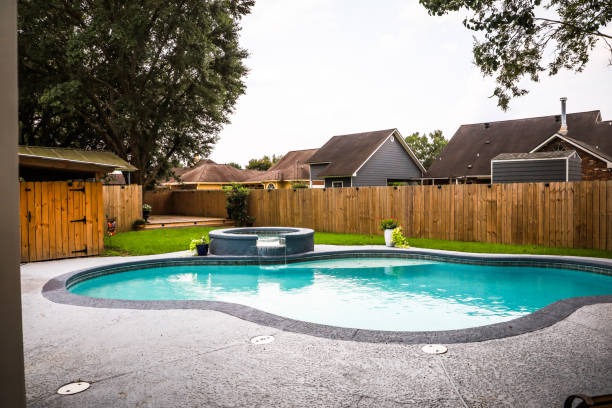Imagine a hot summer day, and you’re lounging by your own swimming pool, cocktail in hand, without a care. Dreamy, right? Well, this dream can become your reality if you carefully choose the right spot for your swimming pool. Location is not just about where the pool fits; it’s about maximizing your enjoyment, convenience, and the overall aesthetics of your home environment. In this guide, we’ll look into the factors you must consider to find the right spot for your new aquatic paradise.
1. Knowing the Sun’s Path
The sun plays a pivotal role in your swimming pool experience. To make the most of those sunny days, it’s essential to understand the sun’s path across your property. Here are a few tips:
-
Natural light: More sun means naturally warmer water and a brighter, inviting pool area.
-
Sunset views: Position your pool to catch enchanting sunset views that can be a perfect backdrop for evening swims.
Shade Dynamics
While sunlight is lovely, too much sun can be overwhelming. Consider the balance between sun and shade. Trees or architectural features can provide relief from the intense midday sun, enhancing the overall pool experience without the need for constant reapplication of sunscreen.
2. Privacy Concerns
No one wants to be on display while relaxing in their pool. Here’s how to ensure privacy:
-
Strategic planting: Use trees, shrubs, or tall plants to create a natural screen around your pool.
-
Fencing: A stylish fence can add privacy and a classy touch to your pool area.
3. Safety Measures
Safety must be a top priority when installing a pool, especially in ground pools NH. Think about:
-
Visibility from the house: Can you easily see the pool from your home’s frequent areas? Keeping an eye on the pool, especially if children are present, is crucial for safety.
-
Slip-resistant surfaces: Choose materials for the surrounding area that provide grip even when wet, reducing the risk of accidents.
4. Convenience and Accessibility
The convenience of your pool’s location affects how often you’ll use it. Consider the proximity to your house:
-
Distance from house: A pool closer to your home ensures easier access and encourages more frequent use.
-
Amenities nearby: Having a restroom, an outdoor shower, or a storage area for pool toys and tools nearby adds to the convenience.
5. Maximizing Your Landscape
Your swimming pool should complement the existing landscape. Integrating the pool with your yard’s layout enhances your outdoor space’s beauty and functionality.
-
Natural contours: Work with the natural contours of your land. A pool that flows with the slope of your backyard looks more natural and can provide unique design opportunities.
-
Views: Position your pool to capture stunning views — whether of a garden, a city skyline, or just the stars at night.
6. Local Regulations and Restrictions
Before diving into pool installation, familiarize yourself with local zoning laws:
-
Zoning laws: Certain areas may restrict pool placement, size, and other features.
-
Building permits: Ensure you obtain the necessary permits to avoid legal issues.
7. Integration with Other Outdoor Elements
A pool should be a part of your overall outdoor lifestyle. Integrating it with other outdoor living areas makes for a more cohesive and functional backyard:
-
Outdoor kitchens: An outdoor kitchen near the pool can make for great poolside parties.
-
Lounging areas: Include comfortable lounging areas around the pool for sunbathing and relaxation.
8. Types of Pools and Their Space Requirements
Different pool types require different amounts of space and have varying installation challenges.
While above ground pools New Hampshire are affordable and more accessible to install, in-ground pools offer greater durability and aesthetic integration with your landscape. The choice depends on your budget, landscape, and how permanent you want the pool to be.
Consider Maintenance Accessibility
Think about the long-term maintenance needs of your pool. Easy access to pool equipment and regular cleaning areas influence the placement of your pool.
9. Environmental Impact
Building a swimming pool can have various impacts on your local environment, which should be carefully considered to maintain ecological balance:
-
Natural habitat: Ensure the pool’s construction does not significantly disrupt the existing flora and fauna. Choose a location that minimizes damage to natural habitats.
-
Water drainage: Consider how pool water and chemicals might affect your surrounding landscape and local water systems. Proper drainage systems should be installed to prevent runoff that could lead to soil erosion or water contamination.
10. Future Landscaping and Development Plans
Think long-term about how your pool will integrate with any future changes or additions to your landscape or property:
-
Expansion space: Allow room around the pool for potential expansions such as a pool house, additional decking, or extended patio areas.
-
Future landscaping: Consider how the mature size of newly planted trees or changes in garden layouts affect the pool area, potentially offering more shade or altering privacy and aesthetics.
Professional Consultation
To ensure that your pool is ideally placed for maximum enjoyment, consulting professionals like a Windham pool company could prove invaluable. Their expertise in local conditions and regulations can save you a lot of headaches.
Final Thoughts
Choosing the right location for your swimming pool involves considering several factors that impact both usability and enjoyment. Each element creates the ultimate backyard oasis, from sun and shade to privacy and safety. With the proper planning and sound advice, you can ensure your pool is a refreshing refuge for years.



